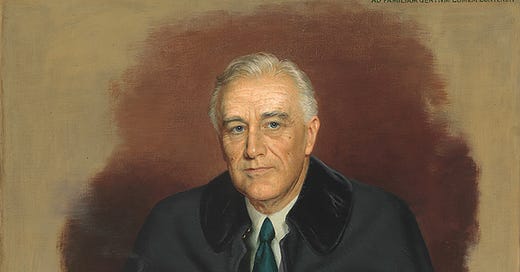March 4, 1933
FDR’s First Inaugural Address
As promised, more good stuff from this timeless speech — on the importance of honesty and character in business and in politics.
All emphasis mine.
Recognition of the falsity of material wealth as the standard of success goes hand in hand with the abandonment of the false belief that public office and high political position are to be valued only by the standards of pride of place and personal profit; and there must be an end to a conduct in banking and in business which too often has given to a sacred trust the likeness of callous and selfish wrongdoing.
Small wonder that confidence languishes, for it thrives only on honesty, on honor, on the sacredness of obligations, on faithful protection, on unselfish performance. Without them it cannot live.
Restoration calls, however, not for changes in ethics alone. This nation asks for action, and action now.
I’d say the man gets it. He seems to be diagnosing the sickness in our society today — the “falsity of material wealth as the standard of success.”
We are sick because the pursuit of money is empty and does not feed our souls. Money — while necessary in this life — cannot be the be all, end all of human existence.
Particularly when the “conduct in banking and in business - too often has given to a sacred trust the likeness of callous and selfish wrongdoing.”
Trust is broken. We must rebuild it through words and action.
Lets start by ending the callous and selfish wrongdoing in business.
Every day I will endeavor to be as courageous as Franklin D. Roosevelt.
Here’s the video:
Some historic context on how the bankers lost public trust — The economy had been in freefall since 1929, and during the period between the election in November of 1932 and the inauguration in 1933, the economy collapsed even further into depression, with bank runs like you see depicted in It’s a Wonderful Life.
From the FDR Presidential Library: “FDR’s election restored hope to many. But before he could take office in March the economy took a disastrous turn. America’s troubled banking system began to collapse. During January and February 4,000 banks were forced out of business. Because accounts were not government-insured, millions lost their life savings. Panicked depositors rushed to the remaining banks to withdraw their money. These bank runs threatened the entire financial system.
In desperation, 32 states declared “bank holidays”— temporarily shutting their banks to prevent depositors from removing cash. Remaining states put strict limits on withdrawals. In an era before widespread credit cards, this meant people could not make purchases. In many places barter, IOUs, and money substitutes called “scrip” replaced cash transactions.”
Sounds awesome. We can thank The New Deal for ending bank runs with the FDIC.
And when did Inauguration Day change from March to January? From the White House Historical Association:
The Twentieth Amendment, also known as the “lame duck” amendment, was proposed and authored by progressive Nebraska Senator George Norris in 1922. While communications and travel during the late eighteenth and nineteenth centuries were more difficult, necessitating a nearly four-month gap between winning election and taking the Oath of Office, by the twentieth century much had improved in terms of travel and technology, allowing for an earlier Inauguration date. Norris also sought to tackle a larger problem. Previously, a president that lost reelection could govern during the lengthy lame duck session without having to be responsible to voters. Shortening this lame duck period was meant to strengthen democracy and avoid a future Constitutional crisis.
After introducing this legislation five times, Norris was finally successful on his sixth try in March 1932. The Amendment passed Congress and was ratified by the States in January 1933.
Today, presidents serve a four-year term, beginning on January 20 at noon, and ending four years from that date and time exactly.
Through Sunday, I’ll treat you to more amazing prose from FDR’s first inaugural address, because it’s just that good.
On Monday, we’ll move on to his first Fireside Chat.
Be sure to subscribe so you don’t miss your Daily Delano — quotes to inspire you from our 32nd President.
As a public service, The Daily Delano will always remain free to all subscribers — but if you want to support a working gal with a paid subscription, I’m much obliged.



